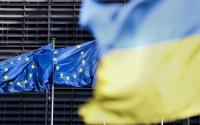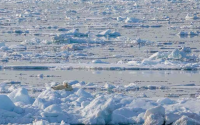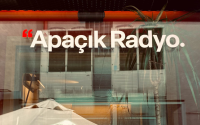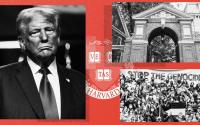November 22 2008
South African Archbishop Desmond Tutu is one of the leading voices for peace, justice and human rights around the world. He was a central figure in the South African struggle against apartheid and was awarded the Nobel Peace Prize in 1984. Today he will receive the J. William Fulbright Prize for International Understanding for his work for peace in South Africa and elsewhere.
AMY GOODMAN: The late great Miriam Makeba, the South African singer, as we turn now to the South African Archbishop Desmond Tutu, one of the leading voices for peace, justice and human rights around the world, a central figure in the South African struggle against apartheid. He was awarded the Nobel Peace Prize in 1984.
Archbishop Desmond Tutu chaired the South African Truth and Reconciliation Commission and currently chairs "The Elders," a group of twelve activists and former public officials advocating for peaceful solutions to global conflicts.
The Archbishop is in Washington, D.C. today to receive the J. William Fulbright Prize for International Understanding for his work for peace in South Africa and elsewhere.
I caught up with him on Thursday at the South African Vice Consul's apartment in New York, right before Archbishop Tutu received the Global Citizens Circle Award.
AMY GOODMAN: Archbishop Desmond Tutu, it's a pleasure to have you on Democracy Now!
ARCHBISHOP DESMOND TUTU: Thank you very much.
AMY GOODMAN: Your response to the election of the first African American president, a son of an African man from Kenya?
ARCHBISHOP DESMOND TUTU: Yippee! No, "yippee" actually—it captures something that is almost inevitable. It's very close to the kind of feelings we had on April the 27th, 1994. And some, maybe a few people in this country, have said it was as it was with Mandela—Mandela moment. It's a moment when especially people of color have a new spring in their step. They can walk a great deal taller than they used to. And that even though this country, the United States, experiences very considerable racism—I mean, people being dragged to their deaths behind trucks—yet, it's a country that, in fact, has had this extraordinary experience, and it's something that has filled people with hope that the world can be a better place.
AMY GOODMAN: How did it feel for you? There were so many millions of people who voted for the first time in this election for Barack Obama. How did it feel for you? How old were you when you first voted in South Africa?
ARCHBISHOP DESMOND TUTU: Sixty-three.
AMY GOODMAN: Sixty-three years old?
ARCHBISHOP DESMOND TUTU: Yes, yes.
AMY GOODMAN: When was it? What year?
ARCHBISHOP DESMOND TUTU: 1994.
AMY GOODMAN: For the election.
ARCHBISHOP DESMOND TUTU: 1994. That was first time. And the first time for Nelson Mandela. And he, too, this extraordinary human being, and the many, many, many, many others.
Actually, in a way, you will say white people who had always voted in racially discriminated elections were voting for the first time, voting for the first time in a democratic—truly democratic—election. So we were all, as it were, on the same page.
But it was—I said then, when I was asked, "What is your—how do you describe how you feel?" I said, "Well, how do you describe falling in love? How do you describe red to someone who is totally blind? How do you speak about the glories of a Beethoven symphony to somebody who is deaf? Well, it's like that. I mean, I'm over the moon. I'm on cloud nine," as were most of my, if not all of my, compatriots on that day.
AMY GOODMAN: What do you think is Barack Obama's greatest challenge as president of the most powerful country on earth, following eight years of George W. Bush?
ARCHBISHOP DESMOND TUTU: Yes. Very clearly, it has been the fact that for those eight years you've had an America that followed a unilateralist line, an American that would not ratify the Kyoto Protocol on climate change. Most of the world had, and America just said, "Go jump in the lake." Most of the world had ratified their own statute that set up the International Criminal Court, which is where the people who were responsible for September the 11th should have been appearing.
That you are going to have—most people believe that he's going to be welcomed as the leader of the free world who will be more collaborative, who will be more consultative, who will not seem to want to throw the considerable weight of America around and seem to want to be the bully boy.
I have said—I did a piece for the Washington Post, and I said one of the things that will demonstrate a clean break from the previous administration would be closing the abomination Guantanamo Bay. And one would then hope that there would be a much more conciliatory approach to Iran, not the, say, the belligerence that has largely characterized the Bush administration. And I would hope, too—and that's a major challenge—that there will be something to be done to bring a viable peace proposal for the Middle East, to end what I reckon is an unconscionable suffering of the Palestinian people. We should end the firing of Kassam rockets on Israeli citizens.
AMY GOODMAN: You were blocked from going into Gaza in 2006, leading a UN delegation there after the killing of a number of Palestinians.
ARCHBISHOP DESMOND TUTU: Yeah.
AMY GOODMAN: What do you think has to be done now with the Middle East specifically, with Israel and the occupation?
ARCHBISHOP DESMOND TUTU: There's been some very interesting moves with the outgoing prime minister suggesting that Israel has to consider very seriously the proposal of going back to the boundaries of 1967. That's a very important initiative, if that was taken.
I think that we would have to move very quickly to lifting the embargo. The suffering is unacceptable. It's totally unacceptable. It doesn't promote the security of Israel or any other part of that very volatile region. And it is quite contrary to the best teachings of the Jewish faith, you know. And I know, I mean, that there are very, very many in Israel who are opposed to what is happening.
And I pray fervently that there will be a boldness, you know, in saying we've got to resolve this, because I think if that—well, no, let's not say "if"—because a lot hinges on what happens in the Middle East. Let's say, when that is resolved, what we will find, I mean, that the tensions between, say, the West and the Muslim world, and large part of the Muslim world, I believe, myself, what we will find that that evaporates and that this—this is a saw, chafing, and it's mucking up too many things. And I pray that this new president will have the capacity to see we've got to do something here, for the sake of our own humility, you know, for the sake of our children.
AMY GOODMAN: Would you compare the occupation of Gaza and the West Bank to apartheid South Africa?
ARCHBISHOP DESMOND TUTU: I have to speak about what I know. I mean, most people—a Jew will usually speak about their experiences and maybe compare whatever it is that is happening with what happened in the days of the Holocaust. For me, coming from South Africa and going—I mean, and looking at the checkpoints and the arrogance of those young soldiers, probably scared, maybe covering up their apprehension, there's no way in which I couldn't say—of course, that is a truth. It reminds me—it reminds me of the kind of experiences that we underwent.
I mean, I was bishop of Johannesburg and would be driving from town to Soweto, where we lived, and I would be driving with my wife, and we'd have a roadblock. And the fact of our having to have passes allowing us to move freely in the land of our birth, and now you have that extraordinary structure that—the wall. And I do not, myself, believe that it has improved security, breaking up families, breaking up—I mean, people who used to be able to walk from their homes to school, children, now have to take a detour that lasts several—I mean, it's—when you humiliate a people to the extent that they are being—and, yes, one remembers the kind of experience we had when we were being humiliated—when you do that, you're not contributing to your own security. And all you are doing is you're saying to those people, in all of their desperation, "We're still human, and there are things we will not be able to accept—I mean, just sit down. We'll have to—we have to do something."
And so, you get the suicide bomber. And one does not condone them, but one understands perfectly how people can be driven into a corner, and out of that desperation—and so you have that cycle. The response of Israel to the suicide bomber, which you know is going to provoke another cycle. And one says, No way, that's not how God intended to us live, that it is possible—it's been shown; it happened in South Africa—it is possible for people who have been enemies to begin to think that they can be friends, at least to coexist.
AMY GOODMAN: The International Criminal Court—should Barack Obama as president sign onto the ICC, sign the treaty for the International Criminal Court?
ARCHBISHOP DESMOND TUTU: Of course! I said earlier that, actually, had America been a signatory, September the 11th , 2001 would have been—the perpetrators were not a country. You know, they were guilty of a criminal—abominable criminal act. And the right thing to do would have been to seek to apprehend those who were responsible. I mean, of course, you had the ones who had died, but then they had collaborators. And the world would have done their darnedest to support America in apprehending those people and bringing them before a court.
And so, I would say, yes, if you believe in the rule of law, then you are going to say, yes, this is one particularly important instrument, because it is an instrument that is saying we will no longer tolerate impunity. The many who are guilty, as is happening just now in the DRC or in Darfur, that people who are guilty of egregious violations have to be brought to book, and it's got to be done in a way that satisfies those standards that we have. I mean, you don't hold people in detention without trial. That's what the world used to say against the South Africa government. And if it was true that that was wrong, it has to be wrong consistently everywhere.
AMY GOODMAN: Do you believe George W. Bush should be tried for war crimes?
ARCHBISHOP DESMOND TUTU: I would want to leave that to the world to determine. I would not, myself, want to see that happen. I mean, like, it's almost like people are wanting to settle scores. I would let it be determined by people who are a great deal more knowledgeable than I.
I'm just sad. I'm sad that he did lose an opportunity. I telephoned the White House in 2003—I was teaching the University of North Florida—to say that I wanted to speak to the President. I didn't. I—well, I mean, who am I? But as it happened, I was in Tallahassee, and Jeb Bush was still the President—
AMY GOODMAN: The Governor.
ARCHBISHOP DESMOND TUTU: I mean, the Governor of Florida. And we were in his house when a call did come, actually, from the White House, and Condoleezza Rice was on the other side, and she said, "The President received your call and has asked me to return it. What did you want to tell the President?" And I said, "I just want to say please give the inspectors more time. If they find this evidence, most of the world will tend to be supportive of action being taken then against Saddam Hussein." And she said, at the time, she didn't think that the President would agree to postpone his intention to invade Iraq. And as I say, the rest is history. I mean, you don't like saying, but we told you so. You know, the world, when September the 11th happened, there was such an outpouring of sympathy for the United States almost everywhere in the world. And that was dissipated recklessly really.
AMY GOODMAN: President-elect Obama supports an end to the war in Iraq but a surge of soldiers in Afghanistan. What are your words of wisdom to him?
ARCHBISHOP DESMOND TUTU: Well, I say that obviously it's to end the war—yeah?—to end the occupation, to—but I've also said it would wonderful if, on behalf of the American people, he were to apologize to the Iraqis and to the rest of the world for an invasion that was based on lies. You know, saying "I'm sorry," that's a very powerful phrase in human relationships. The current prime minister of Australia, one of the very first things he did was to apologize to the Aborigines. And it's amazing what those words, some of the most difficult words in any language, how powerful they are in changing. That's what I've said.
And one would hope, too, that, you know, they see that war hardly ever resolves problems. You just have an exacerbation. I mean, look at Iraq. I mean, and when you think—we don't speak about the casualties that have been suffered by them. I mean, they are spoken of as "collateral damage." I think it's an obscenity, really. But the damage that has been done to infrastructure, the insecurity that has people living, not sure from one moment to the next whether they will be alive—and say, if the money, all the funds that were expended so disastrously, had been used for building up, I mean, you can imagine. You can imagine what it would have been like.
AMY GOODMAN: And to be clear, you're saying that President Obama should apologize to the people of Iraq?
ARCHBISHOP DESMOND TUTU: Yes, on behalf—yes, it's America that invaded, and he's the president of the United States. It's happened. It's happened. I mean, German chancellors have said they apologize for the Holocaust. It's happened. And as I say, this prime minister in Australia has done it to the Aborigines.
AMY GOODMAN: You are receiving an award from the Global Citizens Circle.
ARCHBISHOP DESMOND TUTU: Yes.
AMY GOODMAN: Your response?
ARCHBISHOP DESMOND TUTU: It's a fantastic honor. But I think, much more, I would like to tell you about the people behind that, I mean, the people who did start that. I mean, they've been fantastic citizens working for change in South Africa. They've been some of the most wonderful stalwarts of the anti-apartheid movement. And they've also been very, very engaged in northern Ireland, and the Good Friday Agreement and the change that has happened there is part of the kind of thing that this Global Citizens Circle has been working at assiduously.
AMY GOODMAN: And Miriam Makeba, a quick comment on her passing.
ARCHBISHOP DESMOND TUTU: Oh, Mama Africa. She's just been fantastic. And one wants to say quickly, too, pay a very warm tribute to Harry Belafonte, because Harry Belafonte took her under his wing when she was an unknown. And her singing, her voice, helped many people to know a little bit more about the vicious apartheid system. She was just a tremendous human being, a great loss to us and to Africa. And we pray that she's joining the angels and archangels, lilting away with her voice in heaven.
AMY GOODMAN: Thank you.






